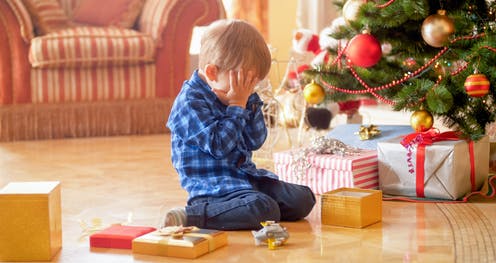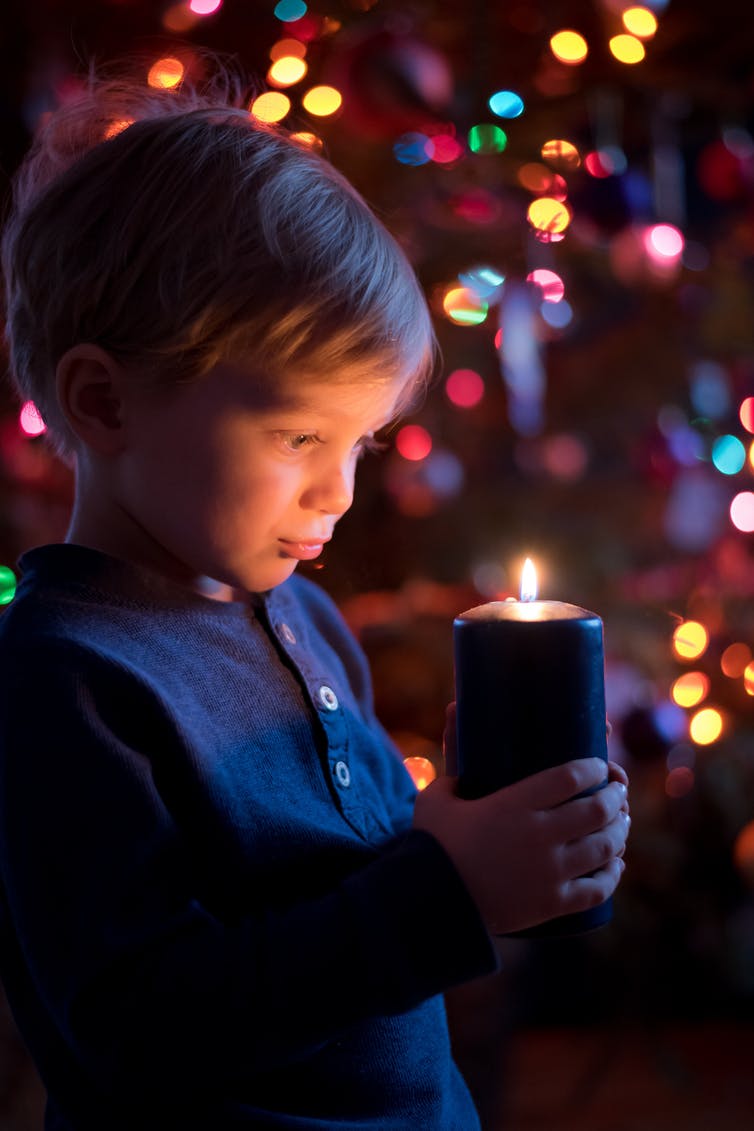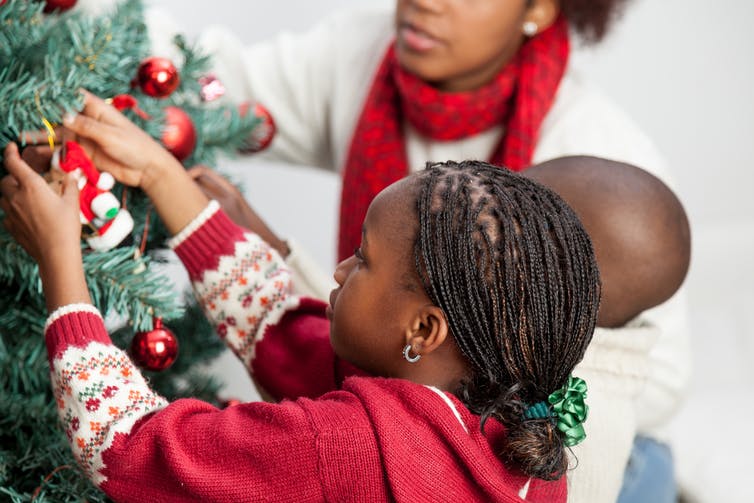
Disappointment About Gifts Is Good for Kids Who Have Enough

Disappointment is a natural human emotion that occurs after a perceived failure. For our young children, this perceived failure can look like not getting the toy they wanted, not being invited to a classmate's birthday party or losing their favorite stuffed animal.
It is essential for children's mental health, well-being and overall development that they experience how to deal with disappointment well. But this can be difficult for parents to handle, particularly around holidays that have grown to involve consumerism, gift-giving and expectations.
North American culture often mistakenly links love and happiness with material goods such as toys; the Santa story promises magical wish fulfilment. This can cause conflict for parents when children do not get the "right" gift.
On holidays, there's social and personal pressure to provide "happiness" and "joy" to children through material objects, which can be confused with providing the necessities. For parents who do not have the resources to provide the "perfect" or "desired" gift this can cause additional stress, shame, guilt and fear around disappointment.
Parents may feel as though they have let down their child and that they have impacted the child's experience or memory of their "special day."
This is especially true if the child has difficulty with or is learning to regulate emotions and expresses disappointment through tantrums or sulking.
These behaviours can affect parents profoundly, often leading them to feel badly about themselves or that the child does not love them.
Sign up for the Live Science daily newsletter now
Get the world’s most fascinating discoveries delivered straight to your inbox.
Focus on traditions over gifts
The holiday season should be about love, connection and spending time together. This is at the core of all family traditions and what children will remember and bring with them as they develop and eventually have their own families.
Traditions and rituals are important for creating meaning and a sense of belonging.

Being a part of something greater than yourself or your immediate family and creating positive loving memories and security are all important for children's emotional, social and cognitive development.
To help children understand the "true" meaning of a holiday season, you might delve more into your own traditions. Or you might like to create new family traditions that provide opportunities to connect with each other and your wider community.
Experiences such as baking for others and donating to a food bank or toy drive can help children to understand that the holidays are for making a positive difference.
Emphasize giving, not receiving
Changing our focus from giving rather than receiving can help our children develop and appreciate the strength in gratitude.
Research has linked gratitude to significant health and wellness benefits such as improving self-esteem, improving sleep and developing empathy.
The other thing to know is that although disappointment feels awful, it is a part of life and is actually a positive and healthy emotion that's central to children's emotional, cognitive and social development throughout their lives.
Parents naturally try to protect their children from pain, to make them feel better from what we deem as negative emotions such as anger, sadness and disappointment.
But it is important for us to equip them with the tools to manage "special" day and day-to-day disappointments. Because ultimately, as they grow older, those disappointing moments in life become more profound.
When parents support children in dealing with disappointment it can lead to the development of adaptation and resilience, which are both important for children in order for them to bounce back from difficult experiences throughout life.
Here are some more ways you can help children deal with disappointment:
1. Acknowledge your child's feelings

Let them know that you understand. It is important to label and validate children's feelings.
Tell your child that you recognize why they are feeling disappointed and that it's OK to express this emotion.
In order for children to develop a positive sense of self, empathy and social skills, they need to be able to feel, label and talk about all feelings.
2. Share your own disappointments
Often times, when children are disappointed about not receiving what they wanted, they also feel badly because they are told to feel fortunate and thankful for what they have.

To encourage children to embrace and express their emotions, it is helpful to share a story of a time when you also felt disappointments.
Perhaps you can remember a holiday when you were young, when you too were disappointed over a dream gift that never arrived. Empathizing with your child's emotional experience will remind them that they are not alone and that their emotions are valid.
3. Be mindful, stay present
It's always important, but especially during the holiday season, to be intentional about the expectations you set for your children. Instead of talking about the gifts under the tree, you could talk about the fun they will have with friends and family during your holiday traditions.
Be present through the disappointment and the behaviour. Disappointment can feel awful for children. The emotion and the behaviour will pass and your child will be stronger and more resilient when they know the boundaries.
4. Don't label your child
During this time, it is important to be mindful of your own language and attitudes. Don't say: "You're acting like a baby."
Although it is difficult, try not to label your child, even if the label describes what he or she has done. You can use questions to motivate change, such as "Are your actions safe?" or "Are your words kind?"
Although the holiday season brings out the best and worst in all of us, if we want to support our child's growth and development it is important that we help them learn to manage and deal with their disappointments everyday.
Through loving, caring relationships our children will always grow and prosper.
Nikki Martyn, Program Head of Early Childhood Studies, University of Guelph-Humber and Elena Merenda, Assistant Program Head of Early Childhood Studies, University of Guelph-Humber
This article is republished from The Conversation under a Creative Commons license. Read the original article. Follow all of the Expert Voices issues and debates — and become part of the discussion — on Facebook, Twitter and Google +. The views expressed are those of the author and do not necessarily reflect the views of the publisher. This version of the article was originally published on Live Science.









